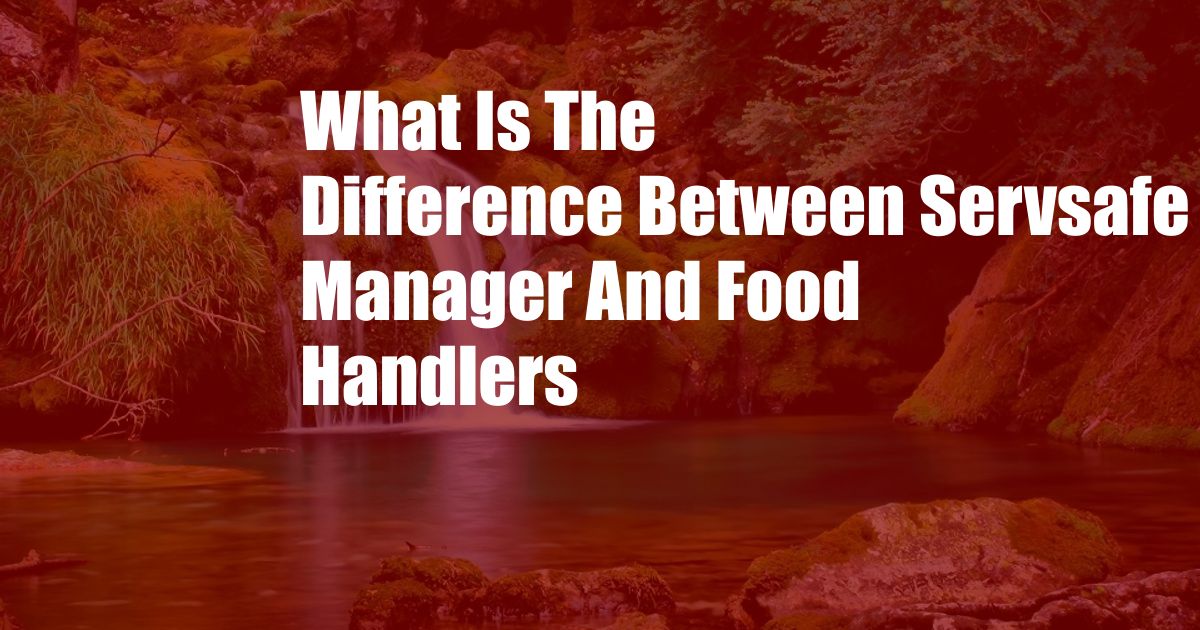
What’s the Difference Between ServSafe Manager and Food Handlers?
As a foodservice professional, ensuring the safety and quality of your food is paramount. Two essential certifications that can empower you to maintain these standards are ServSafe Manager and ServSafe Food Handler. Understanding the differences between these certifications is crucial for determining which one suits your role and responsibilities.
ServSafe Manager and ServSafe Food Handler certifications are both offered by the National Restaurant Association (NRA). While they share a common goal of promoting food safety, they differ in their target audience and scope of coverage.
ServSafe Manager Certification
Who Needs It?
The ServSafe Manager certification is designed for individuals who supervise foodservice operations. This includes managers, supervisors, and owners of restaurants, catering companies, and other foodservice establishments.
Scope of Coverage
The ServSafe Manager certification covers a comprehensive range of food safety topics, including:
- Foodborne illness prevention
- Hazard Analysis and Critical Control Points (HACCP)
- Food handling and storage
- Equipment cleaning and sanitizing
- HACCP plan development and implementation
Benefits of Having It
Obtaining the ServSafe Manager certification demonstrates your commitment to food safety and regulatory compliance. It empowers you to:
- Reduce the risk of foodborne illnesses
- Protect your customers and your business
- Enhance your knowledge and skills in food safety
- Meet regulatory requirements
ServSafe Food Handler Certification
Who Needs It?
The ServSafe Food Handler certification is intended for individuals who handle food, but do not have supervisory responsibilities. This includes food preparation staff, servers, and retail workers.
Scope of Coverage
The ServSafe Food Handler certification focuses on the basics of food safety, including:
- Personal hygiene
- Food handling techniques
- Preventing cross-contamination
- Cleaning and sanitizing
- Time and temperature control
Benefits of Having It
The ServSafe Food Handler certification provides a solid foundation in food safety practices, enabling you to:
- Protect yourself and others from foodborne illnesses
- Maintain a clean and sanitary work environment
- Contribute to the safety of the food you serve
- Meet regulatory requirements
Which Certification Do You Need?
The decision of which certification to pursue depends on your job responsibilities. If you supervise foodservice operations, the ServSafe Manager certification is strongly recommended. If you handle food but do not have supervisory responsibilities, the ServSafe Food Handler certification will suffice.
Tips for Success
To maximize the benefits of your ServSafe certification:
- Take the course seriously: Engage actively with the material and apply it to your daily work.
- Study regularly: Refresh your knowledge by reviewing the materials periodically.
- Stay informed: Keep up with the latest food safety trends and regulations.
- Be a role model: Lead by example and demonstrate safe food handling practices.
FAQ
Q: How long are ServSafe certifications valid?
A: ServSafe Manager and Food Handler certifications are valid for five years.
Q: Can I take the ServSafe exam online?
A: Yes, you can take both the ServSafe Manager and Food Handler exams online.
Q: What is the passing score for the ServSafe exams?
A: The passing score for both the ServSafe Manager and Food Handler exams is 75%.
Q: How much do the ServSafe certifications cost?
A: The cost of the ServSafe Manager certification is $150, while the cost of the Food Handler certification is $75.
Conclusion
Whether you need the ServSafe Manager or Food Handler certification, both options provide invaluable knowledge and skills to enhance food safety practices. By understanding the distinctions between these certifications, you can make an informed decision that aligns with your responsibilities and career goals. Invest in your food safety education and help ensure the well-being of your customers and employees.
Are you interested in enrolling in a ServSafe certification course?